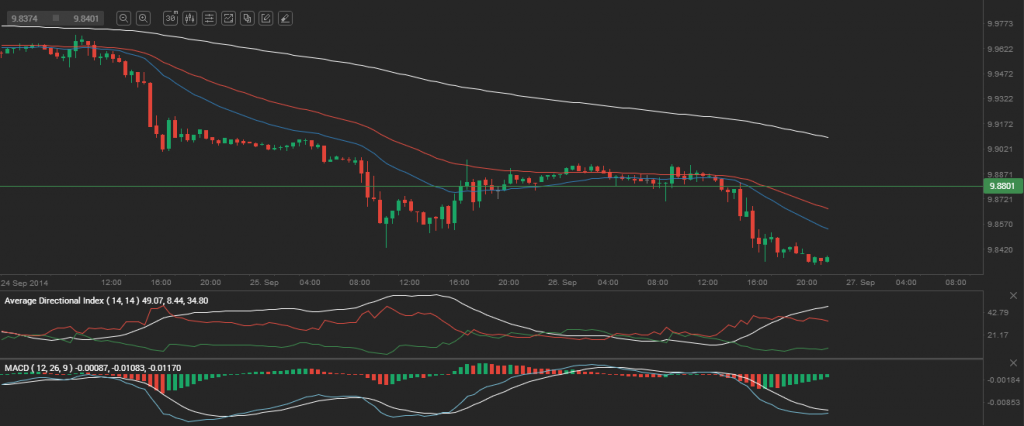Friday’s trade saw EUR/HKD within the range of 9.8320-9.8958. The pair closed at 9.8404, losing 0.47% on a daily basis and 1.04% for the whole week.
Fundamental view
Euro zone
German Retail Sales
Annualized retail sales in Germany probably declined at a pace of 2.2% in August, according to the median forecast by experts, following a 0.7% increase in July. In monthly terms, retail sales probably rose 0.5% last month, after in July sales dropped 1.4%, or the most since April. This is a key indicator regarding spending and, respectively, overall economic activity. Worse than expected performance of the retail sales index may trigger concerns that inflation pressure in the country is low, while this, on the other hand, would lead to a sell-off in the euro. Germanys Federal Statistical Office will release the official report at 6:00 GMT on Monday.
Spanish Consumer Inflation
Spain’s preliminary annualized index of consumer prices (CPI) probably remained steady at -0.5% in September. This would be the lowest CPI level since 2010. In August a drop in food and transport costs was able to offset higher housing prices. Prices of transport fell at an annualized rate of 0.4% in August, following another 0.1% drop in July, while prices of food and non-alcoholic beverages decreased 2.2% last month. Cost of housing, on the other hand, rose at a pace of 0.9% in August compared with a 1.2% increase in July.
Key categories, included in Spans CPI, are food and non-alcoholic beverages (accounting for 20% of the total weight) and transport (15%). Other categories are real estate (12%), hotels, coffee and restaurants (11.5%), clothing and footwear (9%) and entertainment and culture (7.5%). Health, communication, education and other goods and services comprise the remaining 25% of the index.
The CPI measures the change in price levels of the abovementioned basket of goods and services from consumer’s perspective and also provides clues over purchasing trends. In case the CPI dropped more than projected, this would have a bearish effect on the euro. The National Statistics Institute (INE) will release its official report at 7:00 GMT on Monday.
Spanish preliminary annualized CPI, evaluated in accordance with Eurostat’s harmonized methodology, probably was at -0.3% in September, from -0.5% in August.
Spanish Retail Sales
Annualized retail sales in Spain probably declined at a pace of 0.6% in August, according to the median estimate by experts, following another 0.5% drop in July. This indicator reflects the change in the total value of inflation-adjusted sales by retailers in the country and provides key information regarding consumer spending trend in a shorter term, while the latter is a key driving force behind economic growth. Companies, operating in the retail sector, provide monthly data regarding 4 main categories: food, personal equipment, household appliances and additional information in regard to other types of consumer goods. In case the retail sales index decreased at a faster than expected pace, this would have a certain bearish effect on the common currency. The National Institute of Statistics is expected to release the official report at 7:00 GMT.
Euro zone final Economic Sentiment Indicator
Confidence among consumers in the Euro area probably worsened in September. The final Consumer Economic Sentiment Indicator (ESI) probably confirmed the preliminary reading of -11.4 for the current month, which was reported on September 22nd. The index came in at -10 in August. The ESI reflects the level of optimism, which consumers have about economic development. The survey is conducted by phone and includes 23 000 households in the Euro zone. The questions asked stress on current economic and financial situation, savings intention and also on expected developments regarding consumer price indexes, general economic situation and major purchases of durable goods. The indicator measures consumer confidence on a scale of -100 to +100. A reading of -100 suggests a lack of confidence, zero means neutrality and a reading of +100 indicates extreme levels of confidence. Lower confidence usually implies lesser willingness to spend, including large-ticket purchases, while consumer spending is a key factor behind economic growth. Therefore, in case the ESI fell more than anticipated, this would mount selling pressure on the euro. The European Commission is expected to release the final index reading at 9:00 GMT on Monday.
German Consumer Inflation
German preliminary annualized Consumer Price Index probably remained steady at 0.8% during the current month, according to market expectations. In August the final CPI confirmed the preliminary reading of 0.8%. Energy prices dropped at an annualized rate of 1.9% in August. Prices were down in particular for mineral oil products (–4.6%, of which heating oil: –5.0%; motor fuels: –4.4%). Prices of solid fuels dropped 2.5%, while costs of central and district heating were 1.5% lower in August compared to the same month a year earlier. Electricity costs, on the other hand, climbed 1.7%, according to Destatis. Food prices increased at a pace of 0.3% in August this year compared to August 2013.
The index presents a general picture of the price change in the country, while encompassing all household types, all regions and all goods and services demanded (food, clothing, automobiles, rental, repair and hairdressing services etc). The index is based on a basket of goods and services, which is regularly renewed, so that goods and services, purchased more often by consumers, are included in the present survey.
Nations preliminary annualized CPI, evaluated in accordance with the harmonized methodology, probably also remained steady at 0.8% in September. The harmonised index of consumer prices (HICP) increased by 0.8% in August this year over the same month in 2013, or for the fourth time this year, an inflation rate of under 1% was determined for the HICP.
The harmonised methodology is used for the sake of consumer inflation comparison in an international context (among member-states in the Euro region). In case the CPI came above expectations and approached the 2-percent inflation objective, set by the European Central Bank, this would provide support to the euro. Destatis is scheduled to publish the preliminary CPI data at 12:00 GMT.
Hong Kong
At 8:30 GMT Hong Kongs Census and Statistics Department is to report on retail sales in August. The value of total retail sales in July, provisionally estimated at 38.7 billion USD, fell 3.1% over a year earlier. After netting out the effect of price changes over the same period, the volume of total retail sales in July decreased 4.5% compared to the same month a year ago. The revised estimate of the volume of total retail sales in June pointed to a 7.5% drop over the same period a year earlier. Sales of wearing apparel rose 5.0% in July this year compared to July 2013, followed by a 5.8% increase in sales of commodities in supermarkets, a 14.3% increase in sales of medicines and cosmetics and a 7.5% increase in sales of food, alcoholic drinks and tobacco.
The value of sales of jewellery, watches, clocks and valuable gifts dropped 22.2% in July compared to the same month a year earlier, followed by a 10.4% decrease in sales of electrical goods and photographic equipment, a 16.6% decrease in sales of miscellaneous consumer durable goods and a 1.3% drop in sales of commodities in department stores.
In case retail sales continued to decline, this would have a bearish effect on the local currency.
Technical view
According to Binary Tribune’s daily analysis, the central pivot point for the pair is at 9.8561. In case EUR/HKD manages to breach the first resistance level at 9.8801, it will probably continue up to test 9.9199. In case the second key resistance is broken, the pair will probably attempt to advance to 9.9439.
If EUR/HKD manages to breach the first key support at 9.8163, it will probably continue to slide and test 9.7923. With this second key support broken, the movement to the downside will probably continue to 9.7525.
The mid-Pivot levels for Monday are as follows: M1 – 9.7724, M2 – 9.8043, M3 – 9.8362, M4 – 9.8681, M5 – 9.9000, M6 – 9.9319.
In weekly terms, the central pivot point is at 9.8911. The three key resistance levels are as follows: R1 – 9.9502, R2 – 10.0600, R3 – 10.1191. The three key support levels are: S1 – 9.7813, S2 – 9.7222, S3 – 9.6124.






